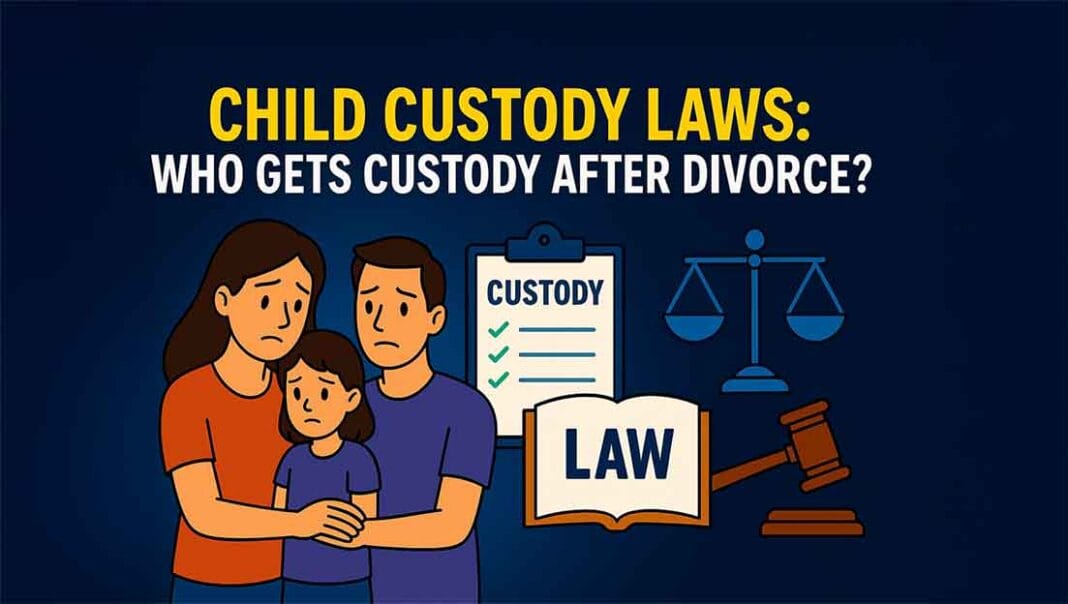Child Custody Laws: Who Gets Custody After Divorce?
Divorce is never easy—but when children are involved, it brings an extra layer of complexity and emotion. Child Custody Laws: Who Gets Custody After Divorce? is a question that thousands of parents ask every year. The answer? It depends—on many things.
In this guide, I’ll break down exactly how child custody works in India (and similar principles elsewhere too), the key factors courts look at, and what you can do to protect your child’s best interests—while keeping your sanity intact.
Also read: Starting Business in India? 10 Legal Must-Knows for Every Entrepreneur
Understanding Child Custody: The Basics
At its heart, child custody is about ensuring a child’s welfare, safety, and healthy development. In India, custody laws fall under various personal laws (like Hindu Minority and Guardianship Act, 1956; Guardians and Wards Act, 1890) and are guided by the overarching principle of the child’s best interest.
Types of Child Custody
When discussing Child Custody Laws: Who Gets Custody After Divorce?, it helps to know the different forms custody can take:
Physical Custody: The child lives with the custodial parent, while the other parent often has visitation rights.
Legal Custody: The right to make major decisions about the child’s education, health care, and welfare.
Joint Custody: Increasingly popular, both parents share physical and/or legal custody.
Third-Party Custody: In rare cases, a grandparent or relative may be granted custody if both parents are unfit.
Also read: Pride Month 2025: 7 Bold Legal Milestones Shaping LGBTQ+ Rights in India
How Do Courts Decide Who Gets Custody?
When it comes to Child Custody Laws: Who Gets Custody After Divorce?, courts don’t favor one parent over the other by default. Some common myths—like mothers always get custody—are just that: myths.
Courts generally evaluate:
The Child’s Welfare: Paramount above all else.
Age and Gender of the Child: Young children often stay with mothers, but it’s not absolute.
Parent’s Financial Stability: Who can provide a stable environment?
Child’s Preference: Older children’s wishes are considered.
Parental Conduct: Any history of abuse, neglect, or addiction is crucial.
Emotional Bond: The existing relationship with each parent.
Joint Custody: A Growing Trend
Modern family courts often encourage joint custody where possible. It promotes the child’s right to maintain strong ties with both parents.
A joint parenting plan usually details:
Living arrangements
Holidays and vacation schedules
Education and health care responsibilities
Also read: Hit & Run or Fender Bender?
What About Visitation Rights?
If one parent gets sole physical custody, the other usually gets visitation rights. Courts set reasonable visitation unless it poses a risk to the child’s well-being.
Can Custody Orders Be Changed?
Yes—Child Custody Laws: Who Gets Custody After Divorce? doesn’t end with the first order. Parents can apply for modifications if circumstances change significantly (e.g., relocation, remarriage, or welfare concerns).
How to Strengthen Your Custody Case
Here are practical tips if you’re preparing for a custody battle:
Maintain a healthy, stable environment for your child.
Keep detailed records of your involvement (school meetings, doctor visits).
Cooperate with your ex—courts value co-parenting.
Never bad-mouth the other parent in front of the child.
Get good legal counsel if needed.
Also read: Scammed Online? Here’s Exactly What to Do if You’re a Victim of Cybercrime in India 2025
Your Rights Matter
Remember: Child Custody Laws: Who Gets Custody After Divorce? is not just about legal rules—it’s about your child’s future and your relationship with them. Educate yourself, stay involved, and don’t hesitate to seek help from experienced family law professionals.
Conclusion
To wrap it up, child custody laws can seem complex, but they all come down to one golden principle: the child’s best interest. If you’re navigating divorce, be informed, stay calm, and remember—you’re not alone.
Also read: Workplace Rights: Can Your Boss Make You Work on Sundays?


